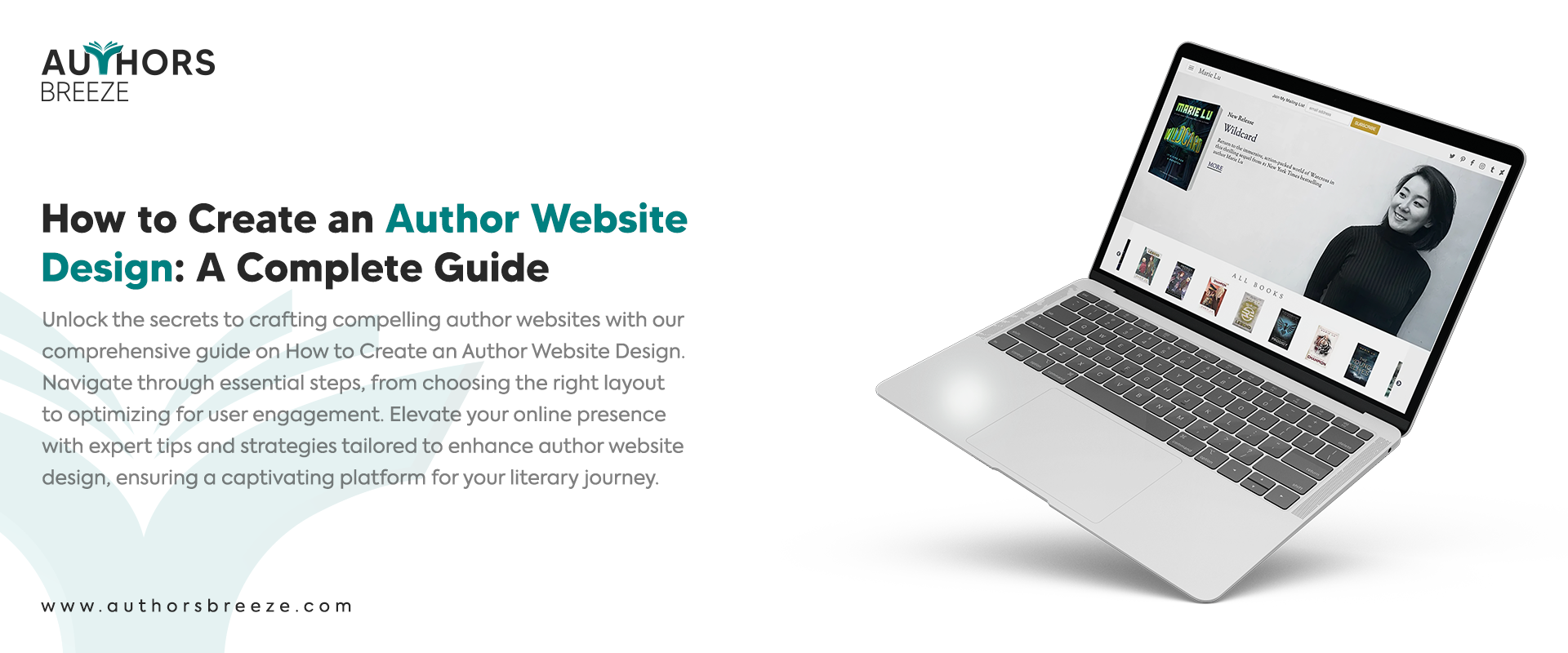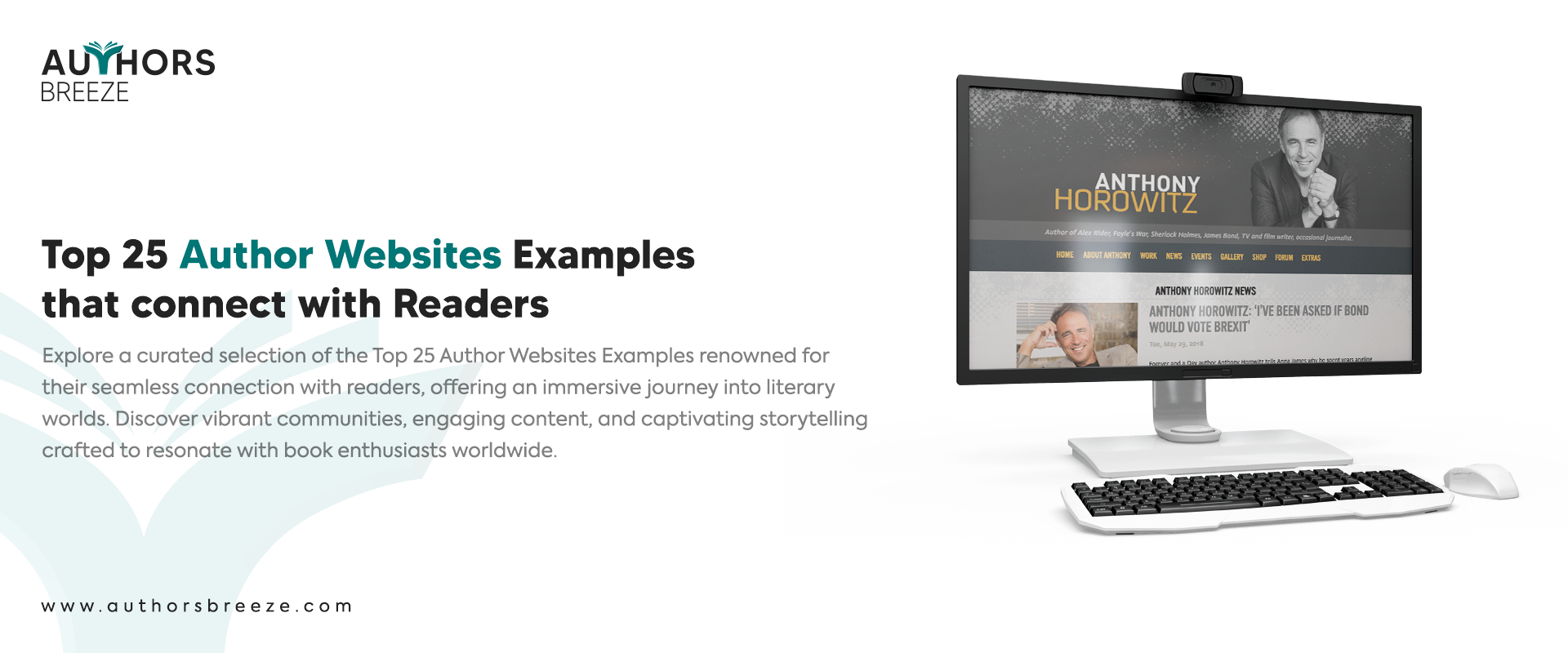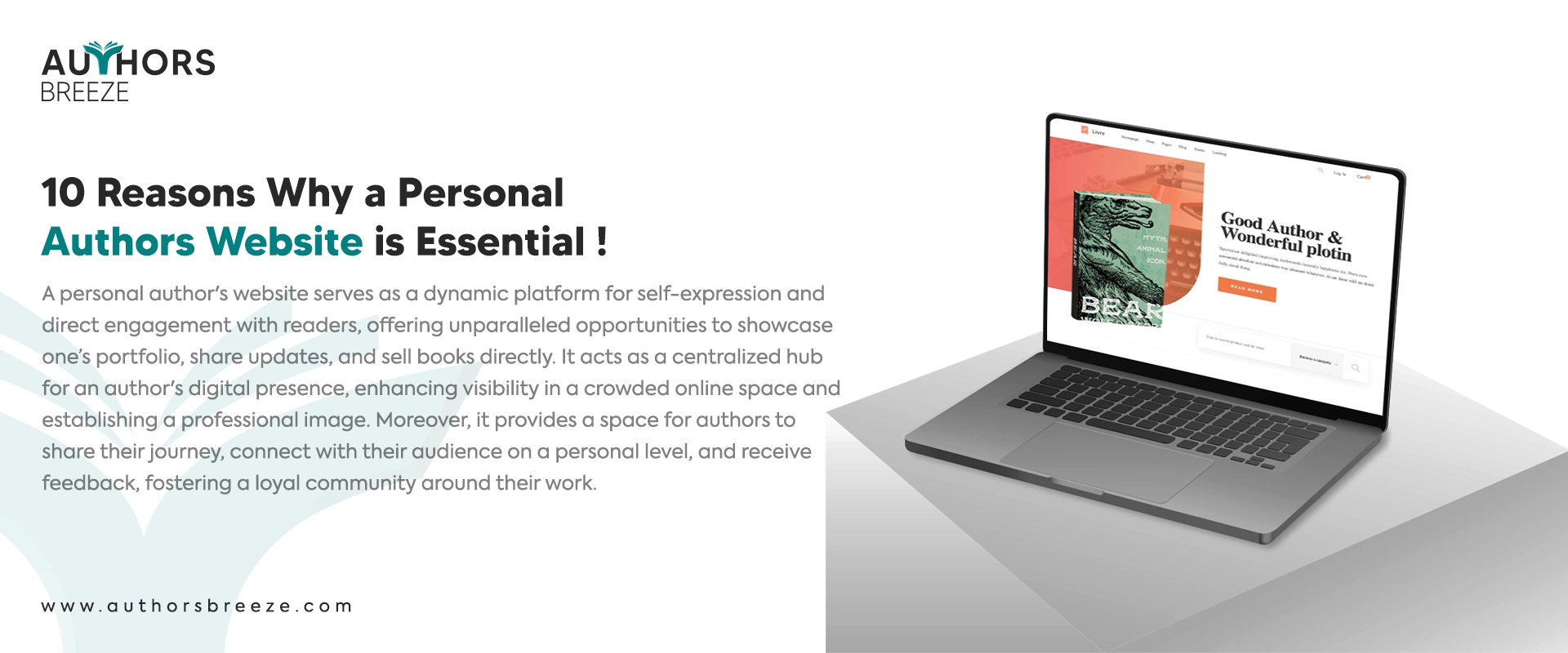Key Takeaways:
- Define your goals and understand your target audience to ensure your author website meets your needs and appeals to your readers.
- Evaluate platforms like WordPress, Squarespace, and Wix based on your technical comfort level and the specific features you need.
- A successful author website design includes a homepage, about page, books page, blog, contact page, and newsletter signup to engage visitors effectively.
- Opt for a user-friendly design with easy navigation, ensure your site is mobile-responsive, and keep loading times quick to enhance user experience.
- Regularly update your website with compelling content to keep your audience engaged.
- Implement SEO best practices to improve your website’s visibility on search engines and attract more visitors.
- Use your website to build a community by encouraging comments, integrating social media, and offering exclusive content through newsletters.
- Leverage social media, email marketing, and other channels to promote your website and reach a wider audience.
- Keep your website updated, secure, and backed up to ensure it remains an effective tool for connecting with readers and promoting your work.
As an author, you would want to reach a wider audience and make a lasting. It is impossible without establishing an online presence. An author’s website can help you with it as it serves as a central hub for everything related to your work. You can showcase your latest publications and upcoming events to blog posts and personal insights on it. Today, we will discuss everything you need to know about author website design. So, let’s begin.
An author’s website is a platform where readers can connect with you. They can explore the themes and stories that resonate with them. In addition, your author platform showcases your work and also enhances your connection with your audience. This guide will walk you through creating an author website design.
Why Authors Should Have an Author Website?
An author’s website offers numerous advantages. It is an invaluable tool for writers of all genres and stages in their careers. Here are some of the key reasons why you should have a website as an author:
Professionalism
A quality author website design lends credibility and professionalism to your work. It signals to readers, publishers, and literary agents that you are serious about your writing career.
Visibility
In a crowded marketplace, a website helps you stand out. It makes it easier for potential readers to discover your books and learn more about you.
Direct Sales
Your author’s website can serve as a platform where you can sell books online directly to readers. You can offer them special editions or signed copies unavailable elsewhere.
Marketing Platform
In addition, it is a space where you can implement book marketing strategies such as:
- Newsletters.
- Pre-order campaigns.
- Exclusive content to engage your audience.
Control Over Your Brand
Unlike social media platforms, where algorithms and policies change frequently, your website is a space you fully control. You can make an author website design to reflect your brand and ensure your most important content is always visible to visitors.
Build Community
You can integrate a blog, newsletter signup, and contact form. As a result, your website becomes a place where readers can engage with you and each other. It will foster a sense of community around your work.
Transform your manuscript into a masterpiece!
Collaborate with our expert publishing team and launch your book. Send your story across the globe, captivating readers everywhere.
How to Create an Author Website Design?
1. Plan Your Website
Author website design seems like something you can not do. However, with some careful planning, you can do it on your own smoothly and easily. The first thing to do to create an author website design is planning. It involves the following:
Define Your Goals
Before you pick colors or write content, you should think about what you want your website to achieve. Your goals will guide every decision you make, from the author website design to what kind of info you will share.
Here are some common goals for the best author websites:
Sell Books
Suppose your main aim is to sell your books. In that case, your website should make it easy for visitors to find and buy them.
Build an Audience
In case you want to gather a group of dedicated readers who can’t wait for your next book, you should share engaging content and encourage visitors to sign up for your newsletter.
Share Your Writing Journey
Some authors use their website as a diary to:
- Document their writing and book publishing process.
- Share updates.
- Connect with fans personally.
You must consider what’s most important to you and what you want to achieve and let that guide your planning.
Identify Your Target Audience
You should know who your author website design is for. It is because this will help you make decisions about its design and content. For example, if you write children’s books, your website might be colorful and fun, with simple language. You might want a darker, more suspenseful look and feel if you’re a mystery novelist. Here are a few tips to identify your target audience:
Consider Your Book Genre
Your genre can tell you a lot about who your readers might be. Think about the age, interests, and even the challenges your ideal readers might have.
Look at Your Current Readers
If you already have a following, consider their characteristics. What do they like about your books? Use this info to make your website even more appealing to them.
Research
Look at websites for authors in similar genres. Notice what works and think about how you can apply these insights to your site.
Choose Your Website Name
People will find you online with your website name or domain name. Therefore, it is vital to pick something that is easy to remember and spell and is related to you or your books. Here are some tips that can help you choose a useful domain name:
Use Your Author Nam
Your name or pen name is an excellent choice if it is available. It is easy for readers to keep in mind and helps build your brand.
Keep It Short and Simple
The best domain names are short and easy to spell. You should avoid using numbers or hyphens if you can. They can confuse people.
Be Memorable
It would be best to pick a name that’s catchy and relevant to your writing. Suppose your name isn’t available. In this case, you can add “books,” “writes,” or something similar to make it unique.
Check Availability
You can use a domain name registrar to see if your chosen name is available. If it’s taken, the registrar will often suggest similar alternatives.
2. Select the Right Platform
Are you done with your plans for creating an author website design? The next step is to decide where and how to build a website. It is where you choose the right platform to develop and host your site. There are many options out there. Each of them has its own set of pros and cons. Let’s look at popular website builders. Then, discuss the differences between using templates for a basic website and opting for custom development.
Overview of Website Builders
WordPress
Pros
WordPress is incredibly flexible and customizable. Thanks to its vast ecosystem of themes and plugins. It is an excellent option if you want complete control over the author website design and functionality. In addition, WordPress is widely used. It means there is a large community for support.
Cons
With more power, learning becomes more challenging. Getting started with WordPress can be more complex. It is also challenging to set up and manage it, especially for beginners. Also, you may need to handle updates and security measures yourself.
Squarespace
Pros
Squarespace is known for its stunning, design-forward templates optimized for mobile devices. It offers a more straightforward, more intuitive interface than WordPress. It is a good choice for those who want a beautiful site without getting into the technicalities.
Cons
Squarespace is easier to use. However, it offers less customization than WordPress. You may find it limiting if you have concrete author website design or functionality needs.
Wix
Pros
Wix is another user-friendly option that’s great for beginners. It offers a drag-and-drop interface. It allows you to customize the look of your site easily without any coding. Wix also has a wide range of templates specifically designed for authors.
Cons
Similar to Squarespace, Wix’s ease of use comes at the cost of flexibility. It is harder to switch templates once your site is live. In addition, advanced features are limited compared to WordPress.
Custom Development vs. Template
When creating an author website design, you must decide between using a ready-made author website template or going for custom development.
Using Templates
Pros
Templates are pre-designed layouts. You can customize them with your own content. They are often easy to use. They require little to no technical skills. It makes them a fast and cost-effective way to get your site up and running.
Cons
Templates can be less unique. In addition, you may find it challenging to make your site stand out if others use the same author website design. Also, you may encounter limitations when you try to add specific features or functionalities.
Hiring Web Designers for Custom Design
Pros
Custom development means your website can be tailored precisely to your needs and preferences. It gives you unique and potentially more professional websites. In addition, you also have the flexibility to add any feature or functionality you want.
Cons
Custom development can be expensive and time-consuming. It requires finding a reliable website designer. Also, you must have a clear idea of what you want to achieve to guide the development process.
Making Your Choice
When choosing the right platform and whether to use a template or go custom, consider the following:
- Your budget.
- How specific are your needs?
- How much time are you willing to invest in learning and managing the technical side of your site?
For many authors, website builders offer an outstanding balance between ease of use, author website design quality, and flexibility, such as:
- WordPress
- Squarespace
- Wix
However, suppose you want something truly unique and have the resources to invest. In that case, custom development is the best place to build a website.
3. Essential Elements of an Author Website
An author’s website is a digital space to showcase your work. In addition, it is a platform where you can connect with your readers and share your journey. If you want to make this connection meaningful, you need to include some aspects in your author website design. Let’s look at these essential components:
Homepage Design
Your homepage will be the first thing visitors will see. So, it is essential to make a great first impression. Consider it as the cover of your book. The way a book cover is inviting and gives readers a glimpse of what to expect, your homepage should do the same. Here are a few tips that can help you create a welcoming and engaging homepage:
Highlight Your Latest Work
You can feature your most recent book or project prominently. In addition, you can use eye-catching visuals and a clear call-to-action (CTA) that encourages visitors to explore more.
Introduce Yourself
It is essential to include a brief introduction or welcome message. This personal touch can make visitors more interested in learning about you and your work.
Easy Navigation
Ensure that the menu is straightforward and guides visitors to other important sections of your website, such as your books, about page, and blog.
About Page
Your about page is where you share your story. It is a chance to connect with your audience personally and give them insight into who you are as an author. Here’s what you can include:
Your Biography
You can share your writing and publishing journey, inspirations, and any notable achievements. However, you need to keep it engaging and authentic and let your personality shine through.
A Professional Photo
A good quality photo of yourself helps put a face to the name as it makes you more relatable to your readers.
Fun Facts
You can also consider adding a few personal tidbits or hobbies to show a different side of you.
Books Page
This section is a virtual bookshelf for your work. It is essential to showcase your published works and guide readers on where they can purchase them. For each book, include:
Cover Images
Use high-quality images of your book covers.
Descriptions
You can give a brief overview of each book. Hook your readers with a captivating summary.
Purchase Links
Add direct links to where your books can be bought, whether they can buy them on major retailers such as Amazon or directly from your website.
Blog Section
A blog is a fantastic way to engage with your audience through regular blog posts. You can share:
- Updates
- Writing tips
- Behind-the-scenes glimpses
- Short stories
Here’s why you should add a blog:
Keeps Your Site Fresh
When you regularly update content, it helps improve your website’s SEO. As a result, new readers can find you easily.
Builds Connection
You can share insights and stories that can help deepen your relationship with your audience.
Contact Page
A dedicated contact page makes it easy for readers, publishers, and media professionals to contact you. On this page, you can:
- Add a simple form for visitors to fill out.
- Provide links to your profiles so visitors can follow you if you’re active on social media.
- List an email address. However, a form is often enough and can help reduce spam.
Newsletter Signup
You can encourage visitors to subscribe to your newsletter. It is a powerful way to build your reader base. Your newsletter can include:
- Updates on your writing.
- Book releases.
- Exclusive content for subscribers.
Make sure the signup form is:
Visibly Placed
Consider adding it to your homepage, footer, or as a pop-up.
Simple
Ask for just the essential information, such as an email address.
Craft Your Book’s Perfect Cover
Boost your book to the next level! Get in touch now to have us design a stunning, compelling cover that will attract, engage, and boost your book’s sales.
4. Design Tips for an Author Website
An author website design that looks good and works well attracts and retains visitors. For authors, your website is a reflection of your work and brand. Here are some design tips to help ensure your author website design is beautiful, effective, and user-friendly.
User-Friendly Navigation
The key to making a website work is ensuring visitors find what they are looking for without hassle. Let’s look at how you can ensure your site is easy to explore:
Simple Menu
Keep your main menu simple. Stick to essential items such as:
- Home
- About
- Books
- Blog
- Contact
Search Feature
In case you have a lot of content, you can add a search bar to help visitors quickly find specific topics or books.
Footer Links
Use the footer for additional navigation links, such as your privacy policy or social media icons.
Visual Branding
The look of your author website design should match the tone and style of your writing. The author website design should reflect whether you write lighthearted vampire romance books or gritty thrillers. You can create a cohesive if you follow the below tips:
Color Scheme
Choose colors that represent your genre and tone. Bright and airy colors work well for romance authors. In contrast, darker shades suit thriller or horror writers.
Fonts
Select a font that makes websites easier to read and also matches the mood of your writing. Serif fonts often convey tradition and respectability. In contrast, sans-serif fonts are seen as more modern and approachable.
Images
You can use high-quality images that complement your books and brand. It could be:
- Photos related to your book’s settings.
- Elements from your book covers.
- Professional portraits of yourself.
Mobile Responsiveness
More people than ever browse the web on their phones or tablets. Therefore, your website must look good and function well on all devices. Here’s how to ensure mobile responsiveness:
Responsive Design
It will be key to choose a website builder or theme that offers responsive author website design. It means your site will automatically adjust to fit the screen the people view it on.
Test on Multiple Devices
You should regularly check your website on different devices and browsers. As a result, you can ensure everything displays correctly and loads quickly.
Simplify for Mobile
Consider how elements like menus and images will look on a smaller screen. You need to adjust sizes or layouts for mobile users.
Loading Speed Optimization
A slow website can frustrate visitors. It can make them leave before they’ve even seen what you have to offer. Here’s how to keep your website speedy:
Optimize Images
Large images can slow down your website. So, use tools to compress images without losing quality.
Minimize the Use of Plugins
Plugins can add functionality to your website. However, they can also slow it down. Therefore, only use the necessary plugins and keep them updated.
Choose a Good Host
Your web hosting service plays a major role in the performance of your website. So, you should look for reputable hosts known for their speed and reliability.
Use a Content Delivery Network (CDN)
A CDN can help speed up loading times. It stores copies of your site on servers around the world. It makes it faster for users to access your site no matter where they are.
5. Content Strategy for Authors
A solid content strategy engages the audience and attracts new readers. You can create a lively and interactive book writer website if you:
- Share compelling content.
- Optimizing for search engines.
- Build a community.
Here’s how you can approach each aspect of your content strategy:
How to Create Compelling Content?
Your website should be a place where readers can get into the world of your writing and publishing. You can keep your content fresh and engaging with the following:
Blog Posts
In your blogs, you can share:
- Insights into your writing process.
- The inspiration behind your stories.
- Tips for aspiring writers.
You can also write about themes related to your books or current events that resonate with your work.
If you want to master the art of blog writing, you can read our blog on Blog Writing Tips.
Author Interviews
Publish interviews with yourself conducted by other bloggers, writers, or media outlets. It can provide interesting perspectives on your work and journey.
Behind-the-Scenes Content
Give readers a peek behind the curtain by sharing something from your books, such as:
- Drafts
- Character sketches
- Maps
You can discuss your research process, as it can also be fascinating for readers interested in the authenticity of your work.
Guest Posts
You can invite other authors to write guest posts for your blog. It provides variety and can introduce your readers to new authors and vice versa.
What are the SEO Best Practices?
Search Engine Optimization (SEO) helps your website become more visible in search engine results. It makes it easier for new readers to find you. Here are some SEO best practices you can utilize:
Use Keywords
Research keywords related to your books, genre, or topics you write about. Then, incorporate these keywords naturally into the content, titles, and meta descriptions of your website.
Optimize Your Images
You can use descriptive file names and alt text for your images. It helps with accessibility and also improves the SEO of your site.
Create Quality Content
You should regularly update your site with high-quality, original content. It is necessary if you want to improve your search rankings. Search engines favor sites that offer valuable and helpful information to users.
Use Internal Links
Link to other author pages within your website where relevant. It helps search engines understand the structure of your site. In addition, it can lead visitors to more of your content.
How to Engage With Your Audience?
A community around your website can turn casual readers into loyal fans. Here are some of the strategies that can help you engage with your audience:
Encourage Comments
It would be best if you end your blog posts with a question or prompt. It encourages readers to leave comments. However, be sure to respond to comments to foster a sense of community.
Social Media Integration
You need to make it easy for visitors to share your content on social media. For this, you can include social media buttons on your site and share links to your latest posts on your own profiles
Newsletters
An author newsletter is a great way to inform your readers about new content, book releases, and events. Offer exclusive content or early access to new books to incentivize signing up.
Online Events
You can also host online events such as live Q&As, webinars, or book readings. It can be an engaging way to interact with your audience in real time.
6. Launch Your Website
A big step you can take to establish your online presence and connect with readers is launching your author’s website. However, to make sure your author website design launch is successful, you need to have everything in place and a plan for promoting your site. Let’s break down the pre-launch checklist. In addition, we will look at some practical ways to promote your website.
Pre-Launch Checklist
Before you announce your author website design to the world, there are some key things to check off your list to ensure everything is ready:
Content Review
You need to review the content of your author website design to check for typos and grammatical errors. It will help you ensure all information is up-to-date and accurate.
Functionality Test
You should test all the features of your author website design to make sure they work as intended, such as:
- Navigation menus
- Links
- Contact forms
- Any interactive elements
Mobile Responsiveness
It is necessary to check your website on various devices (smartphones, tablets). Make sure it looks good and functions well on all screen sizes.
Load Speed
You can use online tools to test the loading speed of your website. Then, make any necessary adjustments. Slow websites can turn visitors away.
SEO Basics
Ensure you’ve implemented basic SEO practices, such as:
- Optimizing titles
- Descriptions
- Using keywords in your content
Privacy Policy and Terms of Use
If you collect any information from visitors (such as email addresses for your newsletter), ensure you have a privacy policy.
Backup
It would be helpful to set up regular backups for your website. It is crucial in order to recover your site in case of technical problems.
Promote Your Website
Once your website is live, it is time that you can get the word out. Here are some tips on how you can promote your website effectively:
Social Media
Share the news of your website launch on all your social media profiles. In addition, you can use engaging posts and include a link to your author website design. Also, consider creating a special launch-day post or a series of posts highlighting different parts of your site.
Email Marketing
Send an email to your mailing list announcing the launch of your website. You can include a brief overview of what readers can find on your site and links to key pages.
Press Release
Suppose you have media contacts or a broader audience. In that case, you can consider sending out a press release or media pitch about your website launch, especially if you are launching with a new book or significant content.
Collaborate with Other Authors
You can partner with other authors in your genre and promote each other’s websites. It can be through the following:
- Guest blog posts
- Interviews
- Social media shoutouts
Online Communities
Authors can share their websites in online communities related to the same genre or writing in general. However, they need to make sure to follow the community guidelines about self-promotion.
Paid Advertising
If your budget allows, you can use paid ads on social media or search engines to drive traffic to your new website. However, you need to target your author and book advertisements to your ideal audience in order to attract the right visitors.
Need Book Marketing Services?
Authors Breeze is here to help you promote your book. Reach readers worldwide with our targeted marketing strategies!
7. Maintain Your Author’s Website
The hassle doesn’t stop once your author website design is up and running. Regular maintenance is necessary if you want to keep your site secure, functional, and engaging for your visitors. Let’s see how you can ensure your author website design remains an effective tool in order to connect with your audience and promote your books.
Regular Updates
Keep your website’s content fresh and relevant. It is vital in order to attract new visitors and encourage previous visitors to return. Here are some tips for regular updates:
Blog Posts
You should publish new blog posts regularly, whether weekly, bi-weekly, or monthly. It could be:
- Updates about your writing process.
- New book releases.
- Personal insights.
- Tips for aspiring writers.
Book Pages
Update your book page with any new releases or editions. Also, keep your purchase links up to date and add book reviews or endorsements as you receive them.
Homepage Refresh
Periodically update your homepage to reflect the latest about your work or any upcoming events. This keeps your site looking dynamic and engaging.
Newsletters
You can use your newsletter to inform subscribers about new content on your website. It can drive traffic back to your site and keep your audience engaged with your latest updates.
Analyzing Performance
You need to check how visitors interact with your author website design. It can help you make informed decisions to improve the experience of your visitors. You can analyze the performance of your author website design with:
Google Analytics
This free tool can track:
- How many people visit your website?
- How long do they stay?
- Which pages did they see?
- How they found your site.
Analyze this data, and you can discover what content resonates with your audience and identify areas for improvement.
Visitor Feedback
You should encourage visitors to leave comments or feedback about your author website design. This direct input can be invaluable and can make your site more user-friendly and engaging.
Performance Metrics
It is also critical to pay attention to metrics such as page loading speed and mobile usability. Tools like Google’s PageSpeed Insights can help you identify technical issues affecting your website’s performance.
Security and Backups
Make your website secure and regularly backed up. It is critical to protect your content and the information of your visitors. Some best practices to ensure safety are:
Security Measures
- Use strong passwords.
- Keep your website platform and any plugins up to date.
- Install security plugins to protect against malware and attacks.
Regular Backups
Set up automatic backups for your website. This ensures that if something goes wrong, you can restore your site to a previous state without losing your content.
SSL Certificate
Ensure your website has an SSL certificate. It secures the connection between your site and your visitors. It is especially important if you collect sensitive information like email addresses.
FAQs
Which authors have the best websites?
Some of the authors with the best author website designs are:
- Ibram X. Kendi
- Miquel Reina
- Helen Hoang
- Jennifer Egan
- Sandra Cisneros
- Rupi Kaur
- LJ Ross
- Mark Dawson
Do authors have their own website?
Yes, the author's website is the main spot on the internet for authors. It's like your online home and the place where your writing career lives. Here, visitors can learn all about you and your books. It offers a great chance for you to show off your work and yourself in the best light, helping you create your unique identity.
What is an author page?
Author pages on websites are special areas focused on a particular author or contributor. It usually features a biography, a profile photo, and a compilation of articles they've published. In addition, it can include links to their social media profiles and other pertinent details.Top of Form
Conclusion
Whether you are starting a website or looking to revamp an existing site, now is the perfect time to take that first step. Each decision you make reflects your unique voice and vision as an author, from the author website design to the content you share. There’s no one-size-fits-all approach to creating an author website design. It means you can experiment and find what works best for you and your audience.
Keep in mind that your author website design is a work in progress. It will grow and evolve with your career. So, don’t be afraid to try new things. In addition, make changes as you learn what engages your audience the most. The most important thing is to start a website. So, take that first step and embrace the process. You will watch your author’s website become a cornerstone of your writing career. It will open doors to new opportunities and connections with readers around the world.
Create Your Own Author Website
If you still face difficulties creating your own author website design, you can hire us. Authors Breeze develops exceptional and engaging author websites.





